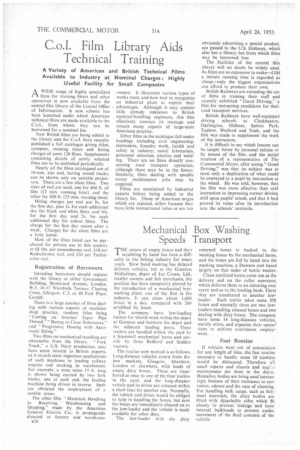Mechanical Box Washing Speeds Transport
Page 60

If you've noticed an error in this article please click here to report it so we can fix it.
THE return of empty boxes and their scrubbing by hand has been a difficulty in the fishing industry for many years. Slow hand washing has delayed delivery vehicles, but at the Granton, Midlothian, depot of Joe Croan, Ltd., trawler owners and fish merchants, the position has been completely altered by the introduction of a mechanical boxwashing plant, one of the first in the industry. It can clean about 1,600 boxes in a day, compared with 200 scrubbed by hand.
The company have low-loading trailers for shuttle work within the depot at Granton and between the depot and the adjacent landing ports. These trailers are handled within the yard by a Scammell mechanical horse and outside by three Bedford and Seddon tractors.
The routine now worked is as follows. Long-distance vehicles return from distant markets, Glasgow, Aberdeen. London or elsewhere, with loads of empty dirty boxes. These are transferred at once to one of the four trailers in the yard, and the long-distance vehicle and its driver are released within a short time for another run. Normally, the vehicle and driver would be obliged to help in handling the boxes, but now the boxes are immediately cleared on to the low-loader and the vehicle is made available for other duty.
The low-loader with the dirty returned boxes is backed to the washing house by the mechanical horse, and the boxes are fed by hand into the washing machine, a Dawson unit based largely on that make of bottle washer.
Clean sterilized boxes come out at the delivery end on the roller conveyor, which delivers them to an elevating conveyor and so to the loading bank. There they are transferred to another lowloader: Each trailer takes some 350 boxes and normally there are two lowloaders handling cleaned boxes and two dealing with dirty boxes. The company have some 14 long-distance vehicles, mainly oilers, and organize their operations to achieve continuous employment.
Fast Routine
• If vehicles went out of commission for any length of time, the, fast routine necessary to handle some 10 trawlers would be dislocated. Therefore all small repairs and chassis and engi.;e maintenance are done in the depot. Homalloy bodies are being used increasingly because of their resistance to corrosion, odours and the ease of cleaning. For handling bulk cargo, such as fishmeal materials, the alloy bodies are fitted with detachable sides. which fit closely tO prevent leakage and have internal bulkheads to prevent undue movement of the fluid contents of the vehicle.




































































































